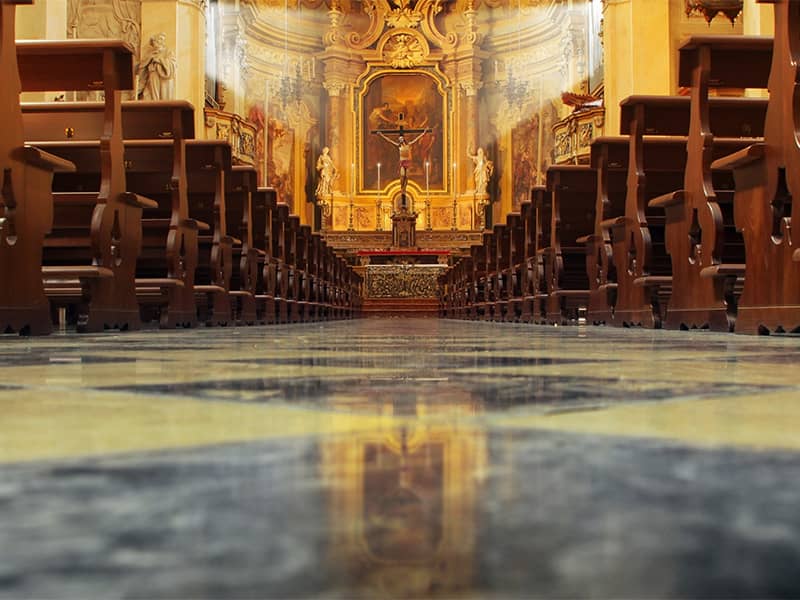His March 20-26 trip to Jordan, Israel and Palestinian territories will take the pontiff to Bethlehem, where Jesus was born, to Nazareth, where he grew up, to the Jordan River, where he was baptized, to Galilee, where he preached, and to Jerusalem, where he was crucified.
It's a visit the 79-year-old pope has planned for a long time as a personal spiritual journey during the Holy Year dedicated to the 2,000th anniversary of Christ's birth.
In seven days of intense activities, the pope will try to bring a simple pilgrim's message to a land scarred by political division and armed conflict.
Even before the pope's arrival, his schedule of events caused political consternation in Israel, which is hosting a pontiff for the first time since Pope Paul VI's visit there in 1964. In the intervening 36 years, two major wars and on-again, off-again peace talks have changed the map in the region, and Jerusalem in particular remains a city contested by Israelis and Palestinians.
A new agreement on church rights between the Vatican and Palestinian leaders in February provoked new tensions with Israel, especially because the agreement condemned unilateral decisions regarding Jerusalem--an extremely sensitive issue for Israel, which has declared the holy city its eternal capital.
Despite the political pressures, the pope will preside over several main events in and around Jerusalem, celebrating liturgies for Christians and visiting religious sites important to the local Muslim and Jewish communities.
In old Jerusalem on the final day of his visit, the pope will visit the Western Wall, sacred to Jews, and the al-Aqsa Mosque, one of Islam's holiest shrines. The two sites lie adjacent to each other and in past years have been the scene of bitter skirmishes between Palestinians and Israelis.
The papal pilgrimage begins March 20 in Jordan with a visit to Mount Nebo, where Moses died after leading the Israelites out of Egyptian captivity, on their way to the Promised Land. The pope will celebrate Mass March 21 in a stadium in Amman, the Jordanian capital, and tour sites near the Jordan River before making his way to Jerusalem late in the day.
On March 22, the pontiff travels the short distance to Bethlehem in Palestinian-controlled territory, where he will celebrate Mass at the place where Christ was born. He will also meet with Palestinian leader Yasser Arafat and visit a Palestinian refugee camp.
The pope spends March 23 in Jerusalem, saying Mass privately in the Cenacle Hall, then making a round of official visits to the two chief rabbis of Israel, to Israeli President Ezer Weizman and to the Yad Vashem Holocaust memorial. He presides over an interreligious meeting in the evening.
On March 24, the pope travels to the Galilee region, celebrating Mass for tens of thousands of young people on the Mount of the Beatitudes, where Christ preached the Sermon on the Mount. Later he will visit nearby sites associated with Christ's life and miracles.
The schedule in Galilee also calls for the pope to meet with Israeli Prime Minister Ehud Barak. The timing of the meeting, shortly before the start of the Jewish Sabbath, has prompted some criticism from Orthodox Jewish leaders, who fear the prime minister might not be able to return home before the start of the holy day.
On March 25, the pope celebrates Mass in Nazareth at the Basilica of the Annunciation, at the site where Mary received the news that she would give birth to Christ. The site became a political hot spot last year after a group of Muslims demanded the building of a mosque adjacent to the church; the Israeli government stepped in with a ``compromise'' solution of a smaller mosque, upsetting local Catholics and Vatican officials.
Later on March 25, the pope returns to Jerusalem to pray privately in the Garden of Gethsemane, the scene of Christ's agony, betrayal and arrest. He presides over an ecumenical meeting that evening.
The final day of the papal pilgrimage, March 26, begins with a papal visit to the grand mufti of Jerusalem at the al-Aqsa Mosque. The pope then visits the city's Western Wall before saying Mass at the Church of the Holy Sepulcher, at the site where Christ is believed to have been entombed. He will meet with Catholic patriarchs and bishops before departing for Rome.
The Vatican said a papal stop on the western side of the Jordan River valley, near Jericho, was still being considered.

